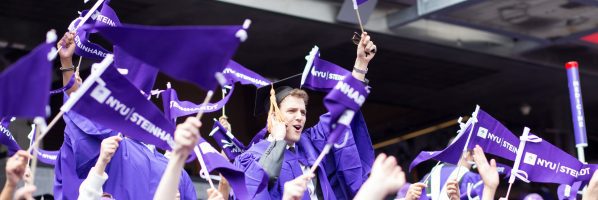Harvard Business, Wharton NYU Stern Commencement Speakers Announced

As spring fully arrives, so do the business school announcements for commencement day. Clear Admit has already discussed the graduation speakers you can expect at Michigan Ross and Stanford GSB. Now, Harvard Business School, Wharton, and NYU Stern have also announced their graduation speakers.

Harvard Commencement
At Harvard Business School, Carla Harris, vice chairman of Morgan Stanley, will deliver the MBA Class Day address. Harris (MBA ’87) has worked for three decades at Morgan Stanley, holding influential positions in mergers and acquisitions as well as equity capital markets. She’s also active at the university as a member of the Harvard University Board of Overseers. In addition, Harris is the focus of an HBS case study about emerging female and minority asset managers.
- Date: Wednesday, May 23, 2018
- Location: Baker Lawn
Wharton Graduation
 Hamdi Ulukaya, the founder, chairman, and CEO of Chobani, LCC, will speak at the Wharton MBA graduation ceremony. Raised in eastern Turkey, Ulukaya launched Chobani in 2007 with the goal of making good food more accessible. Within five years, Chobani had become the number one best-selling Greek yogurt brand in the United States. Beyond his business success, Ulukaya has also had a positive impact on communities through donations to charities, innovative profit-sharing, and paid parental leave.
Hamdi Ulukaya, the founder, chairman, and CEO of Chobani, LCC, will speak at the Wharton MBA graduation ceremony. Raised in eastern Turkey, Ulukaya launched Chobani in 2007 with the goal of making good food more accessible. Within five years, Chobani had become the number one best-selling Greek yogurt brand in the United States. Beyond his business success, Ulukaya has also had a positive impact on communities through donations to charities, innovative profit-sharing, and paid parental leave.
- Date: Sunday, May 13, 2018
- Location: The Palestra
NYU Stern Commencement
 At NYU Stern, graduates can expect to hear from keynote speaker Sallie Krawcheck, the CEO and co-founder of Ellevest, a newly launched digital investment platform for women. Beyond her entrepreneurial work at Ellevest, Krawcheck is the chair of Ellevate Network, a global professional women’s network, and Pax Ellevate Global Women’s Index Fund, which invests in companies that advance women. She’s also a best-selling author and previously served as CEO of Merrill Lynch Wealth Management, Smith Barney, and Sanford Bernstein.
At NYU Stern, graduates can expect to hear from keynote speaker Sallie Krawcheck, the CEO and co-founder of Ellevest, a newly launched digital investment platform for women. Beyond her entrepreneurial work at Ellevest, Krawcheck is the chair of Ellevate Network, a global professional women’s network, and Pax Ellevate Global Women’s Index Fund, which invests in companies that advance women. She’s also a best-selling author and previously served as CEO of Merrill Lynch Wealth Management, Smith Barney, and Sanford Bernstein.
- Date: Friday, May 18, 2018
- Location: Theater at Madison Square Garden
This article has been edited and republished with permissions from our sister site, Clear Admit.
School v. School: NYU Stern or Columbia Business School?

What happens when you pit two of the New York metro’s top business school’s against each other in a head-to-head duel of MBA might? It’s a school vs. school showdown, as we compare Columbia Business School to the Stern School of Business. Let’s take a deeper dive! Continue reading…
Admissions Tip: Clearing Up the Background Check

With a slew of schools releasing their R1 notifications, we know that many of our readers will be asking about the background checks conducted by leading programs. Here are some quick facts to help explain the process:
1. What are background checks?
Background checks involve the verification of information that a candidate has provided in his or her MBA applications. Although the process varies from school to school, it usually includes checking that an applicant attended the undergraduate (or graduate) school(s) that he or she claims to have attended, received the grades indicated and earned the GMAT score reported. It also involves the verification of the candidate’s employment history, job titles, starting and ending dates and salary/bonus information. Finally, some background checks involve contacting recommenders to verify their support and confirming applicant involvement in community activities.
2. Do all schools conduct background checks?
When do they do this? How do they have time? Many of the leading MBA programs like to verify the information that has been provided by applicants. This is typically done only for those applicants who are admitted, since there is no sense in expending resources to verify information for applicants who do not make the cut. Most background checks occur in the spring – after decisions for most rounds have been released and students begin sending in their deposits. In many cases, the schools outsource this function to a professional risk consulting firm like Kroll.
3. Why bother with background checks? Don’t the schools trust me?
The purpose of background checks is to protect all stakeholders of the MBA program (students, faculty, staff, alumni) from those who would falsify their backgrounds to gain an unfair advantage in the admissions process. Some schools opt to investigate the backgrounds of a relatively small sample of randomly selected admits, hoping that the mere possibility of a check will give applicants incentive to be as honest as possible. In a way, this measure therefore serves to increase the adcom’s trust in its applicants.
4. What about very minor discrepancies?
It’s natural for admitted applicants to get anxious at this point in the process, wondering whether their offer of admission might be rescinded if, for instance, the “start date” for an old job is one week earlier than the start date that HR reports during the background check. The good news is that most schools report any discrepancies back to the applicant and give them a chance to explain a plausible mistake. Having said that, it of course makes sense to do your best to verify all of your information before applying to school, so that you can be certain that the data you report is accurate. Should any potential issues come to mind after submitting, you might consider preemptively contacting the adcom if the error is serious enough.
5. Won’t the background checking process alert my employer to the fact that I am applying to b-school?
Since the process typically takes place long after you’ve been admitted, this ideally won’t be an issue, as most applicants give their employers ample notice and take some time off before school. Having said that, the schools still try to conduct the checks in a discrete fashion, consulting with your HR department to verify your dates of employment and salary – but not necessarily revealing that you are heading to business school.
6. How can I ensure a smooth background check?
While the obvious answer is to be honest in your applications, it’s also important that you don’t fudge anything out of laziness (a common occurrence). Dig up those old W-2 forms or check with former employers in order to present the committee with the most accurate information you can.
Stay up to date with all of our latest MBA admissions tips here.
This article has been edited and republished with permissions from our sister site, Clear Admit.
Introducing DeGroote’s 1st EMBA in Digital Transformation Class Grads

The first cohort of Executive MBA students at the McMaster University DeGroote School of Business just wrapped up their graduation, ready to take on the business world with their unique education in Digital Transformation.
Just over a year ago, the DeGroote School of Business launched a new Executive MBA in Digital Transformation, enrolling twenty new students that came to the program already as top players in their fields. The new class had an average of 12 years of professional experience and were an average age of 42. Almost a quarter of the students are international, and have traveled to places like Finland, Hong Kong, and India.
The EMBA in Digital Transformation at DeGroote is a 13-month long program centered around four residential modules in both Silicon Valley, California, and Southern Ontario. The world’s first EMBA focused on the management of digital systems, the program boasts corporate partnerships with CIBC, IBM, SAS, and other top brands.
“DeGroote’s EMBA has equipped me with the right skills and competencies to be able to build a business proposal for a new innovation, and bring forth an idea to executive decision-makers, including board members,” commented EMBA graduate Mỹ Dang, a specialist with more than a decade’s experience in regulatory affairs who currently works with the pharmaceutical company Boehringer Ingelheim.
When asked about why she decided to join the program, Dang told the school:
“I heard about the program when I was looking for a healthcare-focused institution that offered design-thinking and innovation as part of their curriculum. The EMBA also carried the McMaster brand, which is renowned for its leadership in the healthcare space. I am a patient advocate and very passionate about the healthcare sector, which is in dire need of innovation. The EMBA program focused on the exact needs of the healthcare industry, which include leveraging digital platforms and data analytics, as well as integrating design-thinking methodologies, while emphasizing bringing innovation to the forefront. There is much work to be done in healthcare so patients can have better experiences. Current practices were never built from the perspective of patients, and this is becoming increasingly unacceptable. In addition, the pharmaceutical industry has been undergoing significant transformation in the last few years. We are behind, when compared to other business sectors in this digital revolution era. This industry needs individuals equipped to meet the changing times.”
You can read the rest of Dang’s interview and find more information about the DeGroote EMBA program here.
Wharton Professor Extols Virtues of Not Having Too Much Virtue

Adam Grant, professor at University of Pennsylvania’s Wharton, spoke at Utah State University’s 2017 commencement ceremony. Though most graduation speeches encourage students to tirelessly pursue their dream, even in the face of countless rejections, Grant advised students to re-frame their views on giving up.
The Top 10 Business Schools Where MBAs Leave With A Job

U.S. News & World Report has just unveiled its findings on the best business schools in the country for MBAs to earn a job upon graduation.
